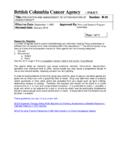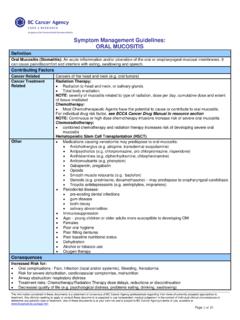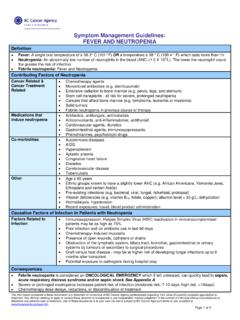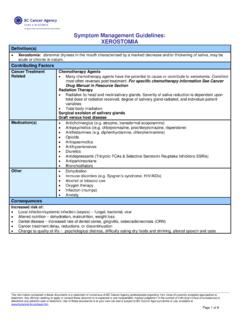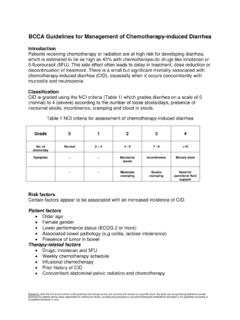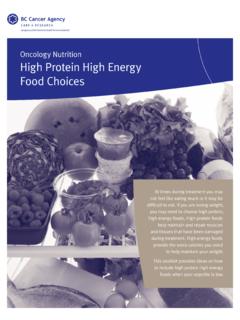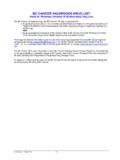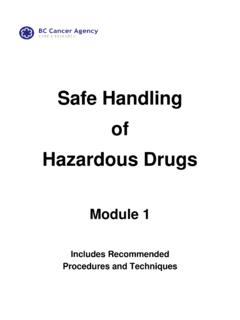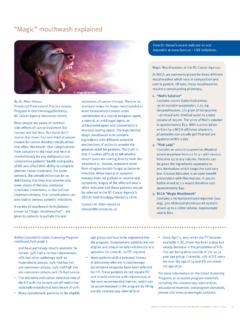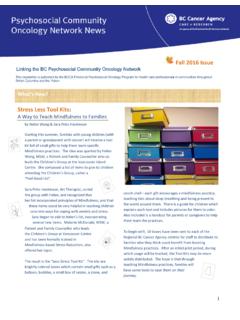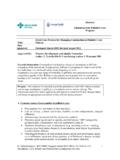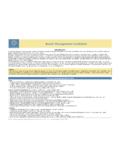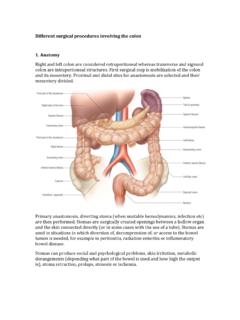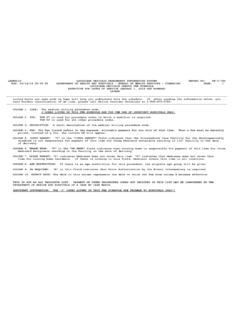Transcription of Symptom Management Guidelines: ANOREXIA and …
1 Symptom Management Guidelines: ANOREXIA and cachexia Definition(s) ANOREXIA : is the involuntary loss of appetite or desire to eat that result in reduced caloric intake and is often associated with weight loss. cachexia : is a complex metabolic syndrome associated with underlying illness and characterized by loss of muscle with or without loss of fat mass ANOREXIA - cachexia Syndrome: is a complex syndrome which is often defined in terms of its primary or secondary causes. Primary causes are related to metabolic and neuroendocrine changes directly associated with underlying disease and an ongoing inflammatory state.
2 Secondary causes are aggravating factors ( fatigue, pain, dyspnea, infection, etc) that contribute to weight loss. Contributing Factors Cancer Related Tumors of the head and neck, gastrointestinal system, lung, liver or pancreas Lymphoma Metastatic disease Metabolic abnormalities (increased muscle catabolism, increased lypolisis)- caused by: - Tumour products - Endocrine alterations - Host systemic inflammatory response Hypercalcemia Cancer Treatment Related Cancer Treatment can directly or indirectly lead to the following symptoms that can contribute to experiencing ANOREXIA and cachexia NOTE.
3 Severity of side effects depends on the area irradiated and treatment schedule - Constipation - Diarrhea - Early feeling of fullness - Fatigue - Oral mucositis - Esophagitis - Nausea or vomiting - Taste/smell changes - Dysphagia - Strictures - Pain - Xerostomia Surgery: - Can cause mechanical or physiologic barriers to adequate nutrition ( short gut) - Imposes an immediate metabolic response that increases energy needs and changes nutrient requirements necessary for wound healing and recovery. Other Alcohol/substance abuse End-stage diseases ( AIDS, renal or hepatic failure) Medications ( some opioids, antibiotics, antifungals) Neurological diseases ( delirium, dementia, Parkinson s disease) Underlying chronic conditions ( COPD, ulcers, rheumatoid arthritis) Conditions that may require use of warfarin ( venous thrombosis, cardiac surgeries) Depression, anxiety or distress Socioeconomic factors ( lack of emotional, social, financial supports) Belief(s)
4 That eating certain foods will make cancer progress/worsen Consequences Increased risk of cancer treatment dosage reductions, delays or discontinuation of treatment Alteration in immune status Weight loss, malnutrition and cachexia , dehydration, muscle mass changes Quality of life psychological distress, fatigue, nausea, compromised role function, decreased functional status, altered The information contained in these documents is a statement of consensus of BC Cancer Agency professionals regarding their views of currently accepted approaches to treatment.
5 Any clinician seeking to apply or consult these documents is expected to use independent medical judgment in the context of individual clinical circumstances to determine any patient's care or treatment. Use of these documents is at your own risk and is subject to BC Cancer Agency's terms of use, available at Page 1 of 9 body image Decreased nutritional status may result in increased INR or increased risk of bleeding for patients on warfarin Focused Health Assessment GENERAL ASSESSMENT Symptom ASSESSMENT PHYSICAL ASSESSMENT Contact and General Information Physician name oncologist.
6 Family physician Pharmacy Home health care Other health care providers Allergies Consider Contributing Factors Cancer diagnosis and treatment(s) note type, date of last treatment Medical history, including history of prior weight loss Medication profile ( warfarin, antibiotics) Recent lab or diagnostic reports (if patient is on warfarin consider increasing frequency of INR monitoring) Note patient score from the BCCA Nutrition Screening Tool on the Patient Reported Information and Symptom Measurement Form (PRISM) Normal How would you describe your appetite normally/before your diagnosis?
7 How would you describe your diet before your diagnosis? Are you aware of any medications that you are taking that could cause loss of appetite ( warfarin, antibiotics) Onset When did you notice a change in your appetite? When did you notice a change in your body weight? Provoking / Palliating What makes it better? Worse? Quality (in last 24 hours) Can you describe your symptoms? How much weight have you lost? How much are you eating and drinking? Region/ Radiation N/A Severity / Other Symptoms How bothersome is this Symptom to you?
8 (0-10 scale, with 0 not at all 10 being worst imaginable) Have you been experiencing any other symptoms? (Note presence and severity of any symptoms that may influence nutritional intake such as: diarrhea, constipation, dysphagia, depression, early satiety, fatigue, oral mucositis, nausea or vomiting, pain, taste changes, xerostomia) Treatment Using any medications to promote appetite? If so, what type? Effective? Using any nutritional supports? If so, what type? Effective? Any other medications or treatments? ( analgesics, steroids, antidiarrheal agents, antiemetics) Effective?
9 Understanding / Impact on You Is this affecting your ability to carry out your normal daily activities (ADLs)? How else is this Symptom affecting you or your family? Vital Signs Frequency as clinically indicated Orthostatic BP measurements Height and Weight Take current weight and compare to pre treatment or last recorded weight Height Observe General Appearance Note strength, mobility, and wasting of skeletal muscle, presence of peripheral edema Assess skin tone, colour, and integrity Hydration Status Assess urine output Assess daily intake and output Assess skin turgor, capillary refill.
10 Mucous membranes Signs and Symptoms of Dehydration Increased thirst Dry mouth Decreased urine output Decreased skin turgor Weakness, dizziness, confusion Increased pulse, decreased blood pressure, postural hypotension Other Assess other systems or symptoms as per patient complaints ( oral assessment if mucositis or xerostomia, abdominal assessment if diarrhea or constipation) The information contained in these documents is a statement of consensus of BC Cancer Agency professionals regarding their views of currently accepted approaches to treatment.
